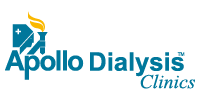Diet while on Dialysis
- Home
- Diet While on Dialysis
Healthy eating can make a difference in your treatments and also, the way you feel. However, dietary requirements of those with early stages of kidney disease will be different from those with kidney failure, or end-stage renal disease (ESRD). If you suffer from any kind of kidney disease, your doctor will determine the best diet for your individual needs, which will help minimize waste content in the blood. The diet is known as a renal diet and helps maintain kidney functioning while preventing further damage.

While all dietary restrictions vary, certain aspects are common to all patients. This includes avoiding sodium, potassium, and phosphorus as the damaged kidneys are not able to filter it. Some people with kidney disease are asked to avoid protein, however, those with ESRD, undergoing dialysis, have greater protein needs than other kidney disease patients.Some people with kidney disease are asked to avoid protein, however, those with ESRD, undergoing dialysis, have greater protein needs than other kidney disease patients.
Why is diet Important in Dialysis: -
- Renal diet minimizer the amount of wastes products & fluid between treatments.
- Improve nutritional and functional status.
- Avoids malnutrition and preserves or achieves healthy body weight.
- Prevent protein energy malnutrition.
- Prevention/ treatment of complications and other medical conditions .
- Reducing risks of uncontrolled DM , HTN, CVD ,Anemia ,Metabolic acidosis, secondary hyper para Thyrodism.
- Prevents mineral and electrolyte abnormalities.
- Promotes better immunity –ability to fight infections.
Request an Appointment
Renal diet for dialysis patients consists of individualized modifications
- Energy
- Protein
- Carbohydrate
- Fat/cholesterol
- Sodium
- Potassium
- Phosphorus
- Calcium
- Iron
- Fluid
Hemodialysis will often increase Energy requirements
- Calories may varies from person to person depend on BMI and the type of dialysis.
- Adults on Hemo-Dialysis and peritoneal Dialysis.
- <60 years old 30-35kcals/kg of ideal body weight.
- >60 years old or obese 30kcals/ kg of ideal body weight.
PROTEIN
- Building blocks to heal, regenerate, preserve body tissues.
- Lower protein diets would be recommended for someone who is not on dialysis Needs are higher than usual because of dialysis loss.
- Amount required is based on body weight.
- 1.2 g protein/kg of ideal body weight for hemodialysis.
- 1.3g protein /kg of ideal body weight for peritoneal dialysis.
- High biological value protein is found on animal source which are totally used by the body and very little waste is left ex: egg, chicken, fish, meat, paneer, milk and cheese.
- Low biological value protein is found in plant source ex: pulses, beans, soya, nuts, seeds and vegetables.
- Key should be Moderation
FATS
- Elevated levels of fat are common in patients with CKD.
- Use liberal amount of oil in cooking (if patients is underweight).
- The ratio of both MUFA : PUFA should be 1:1 or more.
- Total fat should be 25-30% of total calories.
- Dialysis Recommendations : Saturated fats<7%, Cholesterol<200mg/dl
- PUFA : Fatty fish such as salmon, canola oil, olive oil, sunflower oil, Omega -3 fatty acids help in lowering cholesterol.
- SFA : butter, coconut and palm oils, chesses, and red meats.
- Trans fat : should be avoided. (Fast foods, Processed food)
Vitamins and minerals:
The essential elements required by organisms to perform physiological functions and to maintain health.
Hemodialysis Affects Micronutrients Hemodialysis can remove certain vitamins or minerals that leads to deficiencies of vitamins.
Mainly water soluble vitamins are removed ex: vitamin-c, folic acid, B6and B12. It can be monitored through dialysis treatments and supplemented though diet or by supplement from such as multivitamins or in dialysis solution if need.
Mineral levels will be monitored throughout dialysis and recommendations change as lab value change. Reduction of certain minerals through diet may be needed.
Minerals largely affected.
- Potassium
- Phosphorus
- Sodium
- Calcium
- Magnesium
Potassium
- Normal blood potassium is 3.8-4.9mmol/dl
- Potassium intake is limited to 2,500 mg/day for dialysis patients.
- It is important for the healthy functioning of Nerves and muscles (heart).
- Low potassium : hypokalemia can cause abnormal heart rhythms, muscle cramp, vomiting, and diarrhea.
- High potassium : if patient doesn’t receive adequate dialysis, hyperkalemia could occur which is life threatening.
- Adjustment to potassium either from diet or from dialysate are used to achieve normal potassium levels.
- All animal protein are rich and potassium hence moderation should be followed.
- Avoid green leafy vegetables. Fruits recommended 100g/day.
Leaching Method :
Clean and cut the vegetables Cook for 10-15 minutes in water Discard the water and them again repeat the same and use the vegetables for cooking
Phosphorus
Phosphorus control is necessary to prevent hyper para Thyroidism, bone disease, and soft –tissue calcification.it plays a role in making ATP (energy)and is needed for growth and maintenance of our cells.
- Phosphorus works with calcium and vitamin D to maintain bone health.
- Phosphorus may be restricted to 600-750mg/day or 10-12mg/kg of body weight.
- High level of phosphorus leads to itch skin.
Serum sodium normal value 125-145mEq/L
- Plays vital role in regulation of fluid balance and blood pressure
- Uncontrolled can result in High blood pressure
- Fluid retention/ swelling (edema)
- Lead to shortness of breath
- Excessive thirst
- CHF (chronic heart failure)
Tips To Decrease Sodium in Take
- Dietary salt should be restricted 2g/ day for dialysis patient and with hypertension 1.5g/day.
- Limit the salt used in cooking and do not add salt at the table.
- Add herbs and spices to enhance the flavor of the foods in place of salt ex: a dash of lime, garlic, vinegar, pepper, dry chilies etc.
- Avoid or limit bakery foods, packed foods, processed foods.
- Salty foods: pickles, Pappad, chips, salted cheese& butter.
Fluid and Sodium balance
- The kidneys help to balance our fluids. When they are not working, they are not functioning. We have fluid retention. Seen as weight.
- Allowed weight gain between dialysis should be not more than 1.5kg. It indicates whether you are following the fluid intake.
- The amount the fluid intake depends on 500ml+ the pervious24 hours urine output volume.
- A dialysis patient can take fluid less than one liter /day.
Calcium
The amount recommended needed to be based on levels of calcium, phosphorus and parathyroid hormones
- Active form of vitamin D should be taken with calcium for absorption.
- Hypocalcemia can be control by supplements of calcium2,000 mg /day or 15-2.0 g/day.
- Hypercalcemia : stop calcium-based phosphate binders.
- Vitamin D 300,000-600,000 IU may be given twice a weekly to prevent hyperparathyroidism.
IRON AND EPOIRON AND EPO:
- ESRD-Inability of the kidney to produce EPO
- EPO-Stimulates bone marrow to produce red blood cells
- There is also a destruction of red blood cells
- IRON AND EPO
DIETARY TIP:
- Eat well balance meals which contain protein, carbohydrate and fats.
- Eat enough calories.
- Choose proteins that have high biological value.
- Choose healthy fat and limits saturated fats.
- Choose proteins that have high biological value foods ex: egg white, chicken, fish, milk, cheese.
- Cholesterol is Restricted to <200mg/day.
- Total salt intake allowed 5g/day (one tea spoon) 2-3g /day from diet.
- Add herbs and spices to enhance the flavor of the foods in place of salt ex: a dash of lime, garlic, vinegar.
- Potassium intake is limited to 2500mg /day for dialysis. Low potassium foods should be included (or can be leached).
- All animal food are rich in potassium and phosphorus hence moderation should be followed.
Dietary Tips (fluid):
- Avoid excess fluid intake.
- Do not drink large amount of fluids at a time.
- Be mindful of the amount of fluids you are consuming.
- Solid foods like watermelons & milk and curd (150-200ml) contain lot of water follow in moderation.
- Amount of fluid allowed in the diet varies from person to person and depends on 500ml+ urine output.
- A Dialysis patient can take a fluid less than one liter/day.
Food Can Include :
Low potassium or leached vegetables such as:
- Bottle gourd, Snake gourd, Ridge gourd, Bitter gourd, Radish, Cabbage, Kovai, capsicum, Cucumber, corn, onion, parwar, tinder, beans scarlet’s, zucchini
- Fruits : Apple, papaya, pear, guava.
Foods given moderately :
- Whole cereals, pulses & legumes (pulses and legumes can be leached in some cases)
- Chicken, fish, milk, curd, fleshy foods, ginger, garlic, mint leaves, curry leaves, ladies’ finger, broad beans
- Turnip, gouge leaves, fenugreek leaves. Pineapple, straw berry, blue berry.
Food to be Avoid:
- Salt in cooking or on table
- Salted butter, cheese, papas, processed foods, pickles and chutneys
- All foods to which salt or baking soda has been added in cooking
- Fried foods ex: puri, vadai, bonda
- Sea fish, salted meat and salted dry fish, liver etc.
- High potassium foods : Amaranth, coriander, drumstick leaves, spinach, lotus stem, nuts, coffee, cocoa powder, cumin seeds, coconut water, potato, sweet potato, yum, Arvi.
- Fruits : Banana, sweet -lime, jack fruit, , watermelon, jack fruit, orange, avocados, raisins, dried apricots, nuts ,Tender coconut, water juice, soup, cherries, Tender coconut, water juice, soups.
- Alcoholic Beverages & smoking
Leaching method :-
Clean and cut the vegetables. Cook for 10- to 15 minutes in water. Discard the water from them again repeat the same and use the vegetables for cooking.
